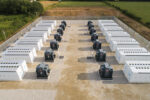Abdul Latif Jameel Energy’s FRV announces first hybrid PV solar-storage project in Australia
- FRV has begun construction of the Dalby Hybrid Power Plant in Queensland, Australia
- One of the first of its kind in the country, the hybrid solar-storage project will combine a Battery Energy Storage System (BESS) with solar photovoltaic (PV) generation panels
- FRV’s ninth project in Australia, the fully renewable plant will be its first hybrid project in the country
- Continuing its global expansion, this announcement is part of FRV’s ambitious growth strategy to become the world’s leading green energy and infrastructure platform
Fotowatio Renewable Ventures (FRV), part of Abdul Latif Jameel Energy and one of the world’s leading renewable energy companies, will develop its first Solar/Storage Hybrid Power Plant in the Dalby region of Queensland, Australia.
The Dalby Hybrid Power Plant is projected to generate 5 MWdc of power once completed and will combine a Battery Energy Storage System (BESS) facility with solar photovoltaic (PV) generation panels, making it one of the first of its kind in Australia. It is expected to be operating at full capacity by early 2022.
The Dalby project continues FRV’s global expansion in the utility-scale storage systems sector and the growth of its pipeline of energy storage capacity. Queensland’s electricity distribution network, Ergon, will enable the plant to supply and take electricity from the grid, and simultaneously trade in the National Electricity Market.
As part of FRV’s commitment to empowering local communities, the project is expected to bring job opportunities to the region: The company has mandated all construction partners to hire local contractors and utilize local suppliers wherever possible.
This project is FRV’s ninth solar farm in Australia, leading to a total of approximately 640 MWdc of owned projects in the portfolio. In 2020, FRV closed 3 deals in Australia, demonstrating the company’s resilience and strong commitment to growing its unique portfolio of solar assets in the country.
Carlo Frigerio, Managing Director of FRV Australia, stated:
“BESS are needed to support further investment in Queensland’s renewables and help maintain system security and reliability. This project will be critical to region’s future energy supply and security as renewable energy capacity increases, with storage supporting solar and wind-generated power to be supplied to the market when it is most needed. The inclusion of PV as part of the project shows the importance of integrating solar and batteries in order to deliver dispatchable power”.
Felipe Hernandez, Global Managing Director of FRV-X, added:
“FRV is already collaborating with governments, regulators, and partners around the world to lay the foundations for a new energy model. Energy storage plays a central and critical role to fully realize the power of renewable energy, and FRV acknowledges the value of this technology as a key element to achieve a decarbonized society”.
FRV has a positive growth trajectory across its key markets and beyond, aiming to invest more than US$ 1.5 billion with the goal of doubling total installed capacity from 2 GW in 2021 to 4 GW in 2024. The company plans to drive this growth through the return on its activities, shareholder contributions and asset rotation through the sale of minority stakes.
Fady Jameel, Deputy President and Vice Chairman, Abdul Latif Jameel, commented:
“FRV is a global leader in renewable energy, committed to making clean energy solutions accessible to communities internationally. The Dalby Hybrid project marks another exciting chapter in FRV’s expansion throughout Australia and will help deliver on the country’s renewable energy objectives.”
The Dalby Hybrid Power Plant adds to an advanced pipeline of FRV’s battery projects spanning a number of key markets. For example, FRV are currently developing two battery projects in the UK, one of which is located in West Sussex. Once completed, the West Sussex project will be one of the most advanced and innovative storage systems in the country.





 1x
1x


 Added to press kit
Added to press kit


